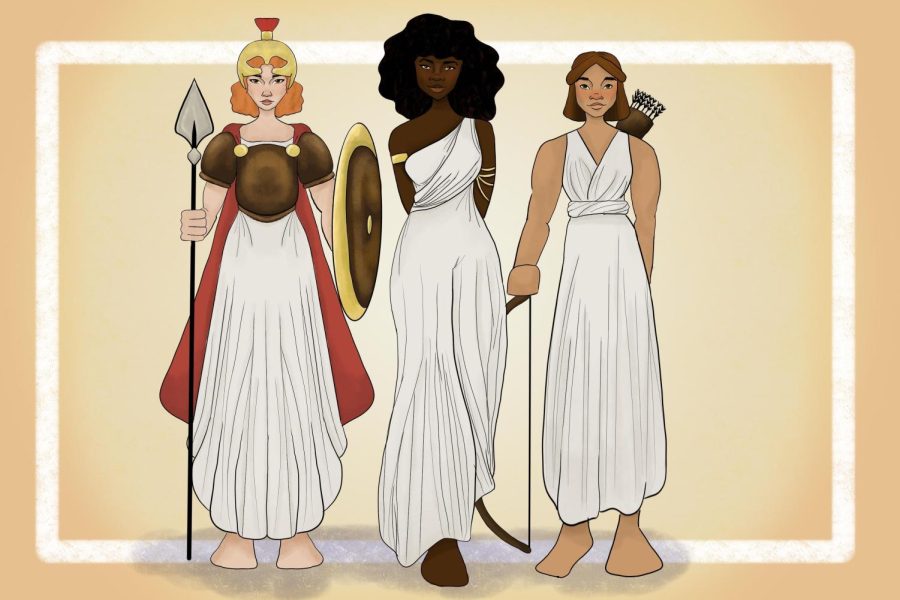Opinion | Actually, the Percy Jackson show shouldn’t be completely accurate to the books
October 20, 2022
Look, I didn’t want to have to write this column.
But I’m worried about the upcoming Percy Jackson show. The books that provided an escape for me as a kid are about to be put on the screen again. But unlike with the mess that was the 2010 Percy Jackson film, author Rick Riordan is heavily involved in this new Disney series and has assured fans that accuracy and faithfulness to the original books will be prioritized.
But that’s my problem.
Don’t get me wrong, I don’t want another Percy Jackson movie fiasco — although I would love to see Logan Lerman return as Poseidon. But after having reread the books as an adult, I realize that Riordan made some majorly questionable, borderline unforgivable, mistakes in his books — especially regarding gender. Disney’s Percy Jackson adaptation, if it can do anything right, needs some major narrative surgery.
Riordan based the Percy Jackson series on Greek mythology, which wasn’t exactly kind to women. Many stories include violence against women or blame placed on women — if they include women at all. The Greek mythology we know was entirely shaped by men — told, then retold, then written down and preserved by men. Women may have told their own versions of well-known stories that placed their perspectives first, but without the resources to save them, these stories disappeared. Thus, the sources we have to represent mythology in ancient Greece today reflect men’s perspectives.
Riordan did not take this skewed point of view into account when writing the Percy Jackson series. Actually, he didn’t seem to question the mythology at all. If he read that a female character was a villain, he probably wrote her as a villain in his stories. Any worthwhile adaptation requires real analysis of the material — understanding what biases the material holds and what the writer’s agenda was. From there, a good writer would make statements on it. Riordan could’ve dove into the accepted narratives of female characters and why they were portrayed as they were and what their situations really would’ve looked like. But he didn’t.
Riordan accepted the source material as it was, rarely providing sympathy to female characters who were victims of a violent patriarchy. Medusa, who in ancient sources was rarely portrayed as aggressive, is now widely considered a monster that needed to be subdued — one who needed to be killed, for the good of the people. In “The Lightning Thief,” Riordan made a bloodthirsty monster out of Medusa, using her as Percy’s first big kill as after learning he was demigod. He didn’t do much better by any other ancient female figures in his stories, like the sorceress Circe, who became a manipulative man-hating witch.
If Riordan had just made the mistake of a poor adaptation, that would have been unfortunate, but forgivable. But Riordan majorly screwed over his original female characters as well, proving it’s not a source material problem — it’s a sexism problem. Thus, we get his habit of writing more boy characters than girl characters. Or his habit of giving boys earth-shattering, world-changing superpowers, while giving the girls much quieter ones — like just being really smart. Or his habit of pairing up two boys and one girl on a quest and incapacitating the girl so that the boys have to save her. I haven’t kept track, but I wouldn’t be surprised if Riordan has thrown this trope into every single book he’s ever written.
And it’s not only his original female characters Riordan does dirty — he also loves to depower his goddesses. Take, for example, the clinching idea of Riordan’s entire world — that the demigod children of the “big three” are extremely dangerous and can cause paramount damage to the world. Thus, these “big three” gods vow not to have any more demigod children — until Percy Jackson comes along, of course. These “big three” gods are Zeus, Poseidon and Hades and are all men. Is it really that unbelievable that an ancient female deity could pass along world-destroying power in a world where ancient deities exist at all?
But even worse, the ultimate prophecy of the Percy Jackson series identifies one specific “half-blood of the eldest gods” as either the savior or the destroyer of the world. Riordan explains to us that the phrase “eldest gods” here refers to a child of the “big three,” but Zeus, Poseidon and Hades are not even the eldest gods. According to the mythology Riordan adopts in his world building, Aphrodite, the goddess of love, is an entire generation older than the rest of the Olympian pantheon. But it’s not only Aphrodite that’s older than the “big three” — Zeus, Poseidon and Hades have three sisters. And while the situations surrounding the birth of these six siblings are debatable — since they involve a bit of baby eating — it’s still impossible to argue that the men are strictly older than the women.
With all these inequalities and inaccuracies that blatantly favor men, it almost seems intentional that Rick Riordan is cutting his female characters down at the knees every step of the way.
I love the Percy Jackson series — I was obsessed with it as a kid and rereading it makes me just as feverishly obsessed with getting through the next chapter. But among all the women-driven mythology adaptations today — the Madeline Miller, Pat Barker and Natalie Haynes stories which give victimized women voices — the OG Percy Jackson just does not stand up to the challenge.
I don’t want the show to fail and I don’t think it will. But I do believe that if Riordan doesn’t step up his game and rethink many of the things he didn’t think of at all in the early 2000s, his beloved show will do his female fans a disservice. The Percy Jackson world he created has been a haven for neurodivergent kids for close to two decades now, but the new show won’t fulfill its intended purpose of making every kid feel seen unless Rick Riordan and all the creatives working on the show make integral changes to rewrite misogynist narratives.
Anna Ehlers is still obsessed with the same things she was obsessed with at 12. You can reach her at [email protected].








